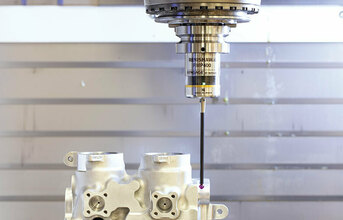
Renishaw, returns to IMTEX for the show's 50th anniversary, which is taking place at the Bangalore International Exhibition Centre, Bangalore, India. The show's 50th anniversary will be marked by the introduction of an Industry 4.0 pavilion. In line with this, Renishaw will showcase a complete automation cell, demonstrating to manufacturers how intelligent process control is key to the operation of a successful smart factory. Additionally, the company will launch several new products to address the industry's need for automated process control.
Intelligent process control
By exhibiting a high-productivity machining cell, Renishaw will demonstrate how integrating smart factory process control can transform a machine shop's production capabilities, improving speed, ease-of-use and flexibility. The cell highlights how CNC machining operations can benefit from high levels of automation and connectivity and demonstrates process control techniques that Renishaw uses in its own factories for automated precision manufacturing.
Renishaw will demonstrate intelligent process control for larger parts, by exhibiting the EquatorTM 500. The new, larger system enables the accurate gauging of larger parts due to a working volume of 500 mm in diameter and up to 400 mm in height, increasing the flexibility and range of applications for the EquatorTM system. Accurate between 5ºC and 50ºC at any rate of temperature change, the system can achieve scanning speeds above 200 mm/s.
The new EquatorTM 500 system is suited to applications such as the manufacture of car and truck transmissions, engine housings and drive train parts. Due to the introduction of Intelligent Process Control (IPC) software, manufacturers can automate process control and tool offset correction directly to CNC machines from any Equator gauge.
"IMTEX provides Renishaw with a global platform to launch several new products, as well as demonstrate many that are established," explained Paul Weaver, Vice President of Sales and Marketing of Renishaw in India. "For a manufacturer to remain competitive, they must be able to machine to close tolerances, provide parts for products with ever shorter lifecycles and adapt to changing consumer demands. Intelligent process control allows manufacturers to make checks and take measurements at all stages of the process to control variation."
(Continued on next page)
